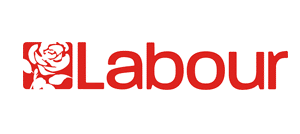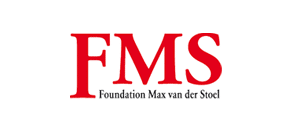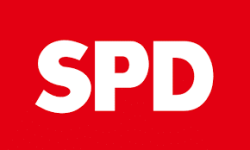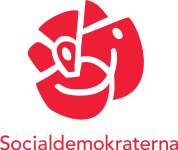Türkiye
Erdoğan is the president of Türkiye since his electoral win in 2014. On 1 November 2015, the ruling AK Party won the snap parliamentary elections in a landslide victory, establishing a majority in parliament and a single-party rule. After the failed coup d’état on the 15 July 2016 by a part of the Turkish military and subsequent state of emergency, a referendum on 16 April 2017 intended to transfer power from parliament and ministries to the president was accepted by a narrow margin. This enabled the president to appoint and fire ministers and top state officials, control the budget, issue decrees, and unilaterally declare a state of emergency. Parliamentary elections are now held every five years, instead of four, at the same time as the presidential elections. Furthermore, the office of prime minister disappeared and parliament lost its right of interpellation.
Bolstered by the result of this referendum, Türkiye under Erdoğan has entered the transition to an increasingly authoritarian state. As part of his policies, opposition parties and critical journalists are marginalised, and pressure on human rights and civil liberties increased. Türkiye’s prospects of eventually joining the European Union have practically vanished due to Erdoğan’s neglect of democratic values. Elections planned for 2019 were held early in 2018, a move that critics view as a political strategy of survival, to secure absolute power.
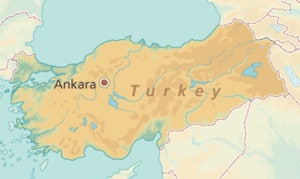
After winning the run-off election and receiving a majority in parliament during the elections in May 2023, it is expected that Erdoğan will further consolidate his authoritarian style of governance. This outcome could also weaken the opposition, as there are indications of potential leadership struggles within the two main opposition parties.
-
Want to get notified by mail when this country gets updated?
Subscribe to our newsflash below!
Key Info
1 Political Situation
Straddling the continents of Europe and Asia, Türkiye’s strategically important location has given it major influence in the region and control over the entrance to the Black Sea. Türkiye’s progress towards democracy and a market economy was halted in the decades following the death of President Ataturk in 1938. The army saw itself as the guarantor of the constitution and ousted governments on a number of occasions when perceived to challenge secular values.
Since then, the AK Party has gained control over the government, and is now the largest party in Türkiye with President Erdoğan at the front. Together with the MHP, their allied far-right party, it enjoys a parliamentary majority and can therefore consolidate authoritarian rule, passing rushed legislation, and side-lining opposition parties. The government has reshaped public and state institutions and is effectively removing checks and balances of power. Nevertheless, the opposition parties, though they are strictly opposed by Erdoğan, maintain a limited amount of power, particularly in cities such as Istanbul and Ankara.
1.1: Economic crisis
Türkiye is currently in a currency and debt crisis, which began in 2018 due to the excessive current account deficit and significant amounts of private foreign currency debt in the Turkish economy. Erdoğan’s authoritarian leadership and unorthodox approach to interest rate policy are exacerbating the economic crisis. While the policy of low interest rates at the beginning of Erdoğan’s election served as a catalyst for generating growth in Türkiye’s emerging market economy, it now created high levels of debt and lending. Instead of raising interest rates, which is the conventional approach to rising inflation, Erdoğan decided to lower them. Türkiye’s central bank resistance to this policy led to the resignation of several bank officials.
During 2021, Erdoğan has come under increased pressure over socio-economic problems in Türkiye. Many Turkish citizens are in socio-economic difficulties due to skyrocketing inflation in the country and took to the streets of Istanbul late 2021 to protest against the financial turmoil in Türkiye. Unemployment rose to fourteen percent in 2021, up from ten percent in 2016. Meanwhile, the Turkish lira has lost 44% of its value in 2021 alone. Erdoğan refuses to implement inflation-curbing measures, as this will possibly be unpopular towards 2023 elections. The AK Party’s popularity declined due to the economic crisis, which resulted in the parties monumental losses in 2019 local elections in Istanbul and Ankara.
After Erdogan’s re-election, his government has taken a new direction in economic policy. This shift is evident in his appointments of Mehmet Simsek as the head of the finance and treasury ministry and Hafize Gaye Erkan, a former Wall Street banker, as the central bank chief. These appointments indicate a willingness to depart from Erdogan’s previous unorthodox policies. The primary objective of the new cabinet is to address the severe economic crisis plaguing the country, characterized by skyrocketing inflation rates, plummeting lira value, a cost-of-living crisis, and depleted foreign reserves.
1.2: Mending foreign relations
Türkiye was an early bird, applying for membership to the predecessor of the EU (the EEC) in 1987 and has been a candidate country since December 1999. Accession negotiations began in October 2005 but have stalled since 2018 given Türkiye’s movement in an autocratic direction. The accession process still exists de jure, but is at a complete standstill due to Türkiye’s lack of political will to improve democracy, human rights situation, judicial independence and rule of law. The European Commission writes in its 2023 enlargement report that reforms for accession are being pursued in a limited way. There is no progress in the fight against corruption and only limited progress in the fight against organised crime. Legislation is still not in line with the European Convention on Human Rights. Freedom of expression has further declined and media independence is not guaranteed. Türkiye’s foreign policy is in many cases not in line with that of the EU, think of its support for Hamas, its failure to implement Russian sanctions and its unilateral recognition of northern Cyprus. The economy is developed but monetary policy, for example, is far out of step with the desired situation.
The relationship with Türkiye has been mostly ‘transactional’ for years and prospects of EU accession have been diluted. According to Türkiye, it is not treated equally with other candidate countries and the EU applies a double standard because of geopolitical considerations. If Türkiye wants to keep serious prospects of EU accession, major reforms will have to be made. Regardless, Türkiye will remain a key partner for the EU.
As a member of NATO, Türkiye controversially threatened to block Sweden’s and Finland’s NATO accession after Russia invaded Ukraine. Finland, who applied for NATO membership alongside Sweden, successfully joined the alliance in April 2023. Türkiye continues to block Sweden’s membership and insists that Sweden must take strong measures against anti-Türkiye protests before receiving the green light to join NATO. Despite Sweden implementing new anti-terror legislation in June, which it believed would address Türkiye’s concerns and facilitate accession, Ankara remains unyielding. Furthermore, Hungary has aligned itself with Türkiye in delaying the ratification process, which requires unanimous agreement. In an effort to overcome these obstacles, Swedish and Turkish officials held constructive talks on 14 June, and another high-level meeting is schedulated to take place in Brussels.
Amid the Russian invasion of Ukraine, President Erdoğan has been very vocal in putting Türkiye as a centre-stage of diplomacy. Shortly after the invasion, he had invited Russian FM Lavrov and his Ukrainian counterpart Kuleba to the ‘Antalya Diplomatic Forum’, where they held much-anticipated talks. However, these remained fruitless as Russia did not cease military actions towards Ukraine. Nevertheless, Türkiye remains open to hosting new negotiations between Ukraine and Russia, with Erdoğan positioning himself as a mediator in the conflict. For instance, Turkish diplomacy was one of the key contributors to the conclusion of the grain agreement that will allow Ukraine to export grain from its ports during the war. Türkiye continues to maintain ties with both sides in the conflict. Erdoğan has expressed support for Ukrainian sovereignty, including returning Crimea to Ukraine. At the same time, the Turkish government refuses to join the sanctions imposed by the West on Russia and is tightening financial bonds with the Kremlin, such as a new energy cooperation.
Türkiye also mended ties with various regional countries, as Erdoğan tries to boost his legitimacy towards 2023 elections and wishes to increase economic ties to improve on Türkiye’s economic problems. In 2022 alone, Türkiye has mended ties with various regional foes, such as Israel, the UAE and Saudi Arabia. The thawing of relations with Saudi Arabia is salient. In 2018, these countries were fiercely opposed after the assassination of journalist Jamal Khashoggi in the Saudi consulate in Türkiye.
Furthermore, Türkiye opened diplomatic talks with its neighbour Armenia – and decided to resume flights between its capitals and open the border between the countries. This has been a major breakthrough after years of animosity over various cultural, historical and commercial issues between Yerevan and Ankara.
1.3: Run-up to the 2023 elections
The Turkish general election took place in May 2023. The main themes affecting these elections were the deepening economic crisis, dissatisfaction with the situation of the Syrian refugees in Türkiye who cannot return home and the growing alienation of liberal and democratic-minded Turkish youth from the increasingly conservative and authoritarian government regime. The situation regarding Syrian refugees is part of an EU-Türkiye migration deal, in which both parties agreed that Türkiye would take any measures to prohibit irregular migration from Türkiye to Greek islands and enabled the EU to send anyone arriving irregularly back to Türkiye. In exchange, Türkiye would be granted 6 billion euro by the EU in humanitarian aid for improvement of the refugee situation in the country and Turkish nationals would be granted visa-free travel to Europe.
Erdoğanran for another term as president of Türkiye as the joint candidate of the current coalition between AK Party and MHP. The popularity of the MHP has steadily declined. Their alliance, known as the People’s Alliance, faced difficulties retaining a parliamentary majority, especially as the opposition formed a second bloc in February 2022. This opposition alliance, known as the Table of Six, consists of Republican People’s Party (CHP), Democracy and Progress Party (DEVA), Democrat Party (DP), Future Party (FP), IYI (Good) Party and Felicity Party (SP). Their alliance is mainly unified through hostility towards Erdoğan and the aim to return democracy in Türkiye, despite the ideological diversity among the opposition parties. The opposition parties were considered to stand a chance against the People’s Alliance, especially as voters from the MHP and AK Party seemed to switch to the Good Party, which is a breakaway fraction of the MHP.
The People’s Democratic Party (HDP) was notably absent from the Table of Six. The party was important in opposition wins at the 2019 local elections but is now deemed as too divisive to have a role inside the oppositional bloc However, HDP formed a third bloc together with five more Kurdish and leftist parties that carry little political weight. This last bloc is called the Labour and Freedom Alliance. The closer the elections approached, the more clear the expectations became. With tightened media laws, for instance, Erdoğan seemed to be pulling out all the stops to prevent an opposition victory.
Kemal Kilicdaroglu, the longstanding leader of Türkiye’s social democratic CHP, was chosen as the opposition’s champion in the six-party National Alliance to challenge President Erdogan in the elections. Kilicdaroglu gained popularity in Ankara by exposing corruption allegations against prominent figures in Erdogan’s AKP. The strategic choice of Kilicdaroglu over more popular figures like Imamoglu and Yavas can be attributed to their vulnerabilities in various aspects.
With an anti-migrant sentiment rising in Türkiye, migration was an important topic in the elections. The opposition National Alliance bloc pledged to create opportunities and the conditions for the voluntary return of Syrians. “Our approach would be to rehabilitate the Syrian economy and to create the conditions for voluntary returns,” stated in their opposition program. The opposition wanted to seek to revisit the 2016 agreement with the EU on migration. Çeviköz said. “Our migration policy has to be coordinated with the EU,” he said. “Many countries in Europe see Türkiye as a kind of a pool, where migrants coming from the east can be contained and this is something that Türkiye, of course cannot accept. This doesn’t mean that Türkiye should open its borders and make the migrants flow into Europe. But we need to coordinate and develop a common migration policy.” Erdoğan also took a tougher position on the refugee matter, slowly changing to a discourse that would see refugees return to Syria. In January, Erdoğan announced more than half a million Syrians had chosen to go home.
Erdoğan focused his Justice and Development (AK) Party’s manifesto on the recovering from the earthquakes in February. He pledged “we will completely heal the wounds caused by the disaster in 11 provinces and their neighboring cities by building a total of 650,000 new houses, 319,000 if which will be delivered in one year.” Erdoğan also promised to bring inflation down to single digits and said “We will increase the welfare level of our employees, from civil servants to retirees and workers, by always increasing their wages above inflation.” He however did not mention returning to more orthodox economic policies, and said the low-rate policy was the main driver of entrepreneurs investing in the real sector and creating jobs.
Erdogan’s campaign strategy involved a combination of pre-election giveaways, such as free gas, raising the minimum wage, and providing free internet to students. He also resorted to bitter attacks on Kilicdaroglu, accusing him of collaborating with terrorists and supporting LGBTQ+ rights, despite no statements on LGBTQ+ rights being made by the opposition parties in the national alliance. Erdogan even shared a manipulated video to associate Kilicdaroglu with a militant Kurdish organization.
The polls of Türkiye’s election were not a resemblance to the actual result, with polls suggesting Kilicdaroglu would take the lead, resulting in a big surprise for markets and voters when Erdogan came ahead in the race. His strong election result was unexpected as his unorthodox low interest-rate policies created currency crashes in recent years and cost-of-living crisis as inflation soared above 85% last year. The forecasts for the runoff were being disregarded. Erik Meyersson, chief emerging markets strategist at SEB, said opinion polling in Türkiye can often be misleading. He said: “Voters may have engaged in signalling, to the extent that they indicated their displeasure with the government’s policies by upping the opposition in opinion polls but consequently supported the incumbent in the elections.” Erdogan’s emphasis on prioritising national security interests over economic challenges seems to have resonated with a significant part of his conservative and nationalist supporters. In the initial round of elections on May 14, there was already widespread dissemination of fake news concerning the opposition. However, head of the Turkish national committee for the International Press Institute (IPI), Emre Kizilkaya, said that Türkiye has experienced an unmatched level of organised disinformation during the runoff campaign. She said “Truth and factual information have come under a coordinated assault from multiple sources, with the government playing a central role in this troubling phenomenon, as evidenced by Erdogan’s tactics to tarnish the opposition through various channels.” The ongoing political campaigns are intensifying, and there is a noticeable rise in the circulation of fake posters targeting the CHP. One of these posters displays the CHP’s logo and carries the message: “To us, the YPG is not a terrorist organization. Decide now!” The YPG refers to the People’s Protection Units, a Kurdish militia in Syria closely associated with the Kurdistan Workers’ Party (PKK), which is recognized as a terrorist organization by Türkiye and several other countries. Teyit.org, a fact-checking organization, has analyzed these posters and confirmed that they are not part of the official election campaign of the CHP.
Following President Erdogan’s repeated claims that the PKK was providing support to Kilicdaroglu, the CHP has taken legal action by filling a criminal complaint against Erdogan and against those who created and spread the video. The complaint stems from a montage video shared by Erdogan and falsely portrays PKK executives singing the campaign song of Kilicdaroglu. Erdogan accused Kilicdaroglu of relying on the PKK terrorist organization and disregarded the authenticity of the video. He said “The CHP leader relied on the PKK terrorist organization. It doesn’t matter if it’s a montage or not. PKK members supported the opposition with videos.” According to Guney Yildiz, researcher at the University of Cambridge, this is against the Turkish law, which prohibits knowingly sharing false information for political gains. Additionally, the Erdogan administration consistently accused the CHP of engaging in “terrorist collaboration” due to its dialogues with the Peoples’ Democratic Party (HDP) and Kilicdaroglu’s pre-election commitment to seeking a peaceful resolution to the Kurdish conflict in Türkiye. According to Soner Cagaptay, senior fellow at the Washington Institute for Near East Policy, Erdogan’s strategy worked: “By referring to Kilicdaroglu as a not-good-enough Muslim and he support from terrorists, appealed to right-wing voters that were supposed to pick Kilicdaroglu.”
Kilicdaroglu’s stance on immigrants hardened during the runoff. Before the initial elections he already pledged to repatriate Syrians on a voluntary basis within two years. In the runoff he took a much harsher approach and vowed to send all refugees back in two years, if he becomes President. During the runoff campaign, Kilicdaroglu made allegations against the government, claiming they had permitted the entry of 10 million “irregular” migrants into the country. He cautioned that the number of migrants could potentially rise to 30 million, but failed to present any supporting evidence to his claims. Additionally, Kilicdaroglu criticized Erdogan for his alleged failure to safeguard Türkiye’s borders and honor. Analyst Oznur Kucuker Sirene said that the anti-immigration sentiment will likely appeal to nationalist voters. He said “The alliance with the HDP did not win the election, on the contrary, they were greatly disappointed. It became apparent that the determining factor of the election was the nationalist voters.” Kilicadoroglu also accused Erdogan of working with terrorists as he points to the AKP for its cooperation with the radical Islamist Free Cause Party (HÜDA-PAR) The HÜDA-PAR has an affiliation with the radical Islamist Terrorist organization Hizbullah. This refers to peace efforts made between Erdogan’s government and PKK, which collapsed in 2015. Kilicdaroglu said: “I have never sat down with terrorist organizations, and I will never do.”
1.4: Political rights and civil liberties
In the Türkiye of today, political rights and civil liberties are limited, and it has the status of ‘not free’ according to the NGO Freedom House. The media landscape is limited to a few companies, most close to the Erdoğan presidency, sometimes as a necessity, to avoid further limitations by the president. Critical online news providers do still exist, but they are being actively targeted. Dozens of media workers and journalists are held in pretrial detention or are serving sentences for terrorism offenses. During the COVID-19 pandemic, the government attempted to manipulate the statistics, and critics, independent medical personnel, and even civilians sharing independent information related to the pandemic were arrested. In October 2022, the government tabled a new bill criminalising the spread of disinformation. The law’s vague definition of what constitutes disinformation appears to give the government more power to censor and target government-critical organisations and journalists.
Though there remains a certain element of political pluralism, it is being increasingly limited. The government has cracked down on opposition parties and seriously harmed political rights and electoral opportunities for minority groups, most notably Kurds. Since the summer of 2021, the Kurdish party HDP is faced with a closure case, and the question remains whether the party will continue to exist. It has been accused of “terrorism” through ties with the Kurdistan Workers Party (PKK), though the HDP denies this. In the beginning of January 2023, the Constitutional Court issued an order to freeze the bank accounts of the party. Due to the imminent risk of being shut down, the HDP made the choice to participate in the elections under the umbrella of the Green Left Party.
Just three weeks prior to the elections, Turkish authorities conducted a widespread operation across 21 cities, resulting in the detention of over 150 individuals including journalists, politicians, lawyers and human rights activists. The detainees were targeted for their alleged connections to Kurdish militants.
The judiciary in Türkiye is also being limited in its independence. In July 2021, Parliament passed a law changing the structure of bar associations, weakening the associations’ authority and independence. Though this move was met with protest by 78 out of 80 bar associations, it was enforced, limiting the independence of the judiciary.
International observers of the Organization for Security and Co-operation in Europe (OSCE), assessing both the first round on 14 May and the run-off on 28 May, concluded that while the elections were free, they were not fair. According to them, the media bias and ongoing restrictions on freedom of expression created an uneven playing field, leading to an unjustifiable advantage for the incumbent in the elections. The organization called for an end to speeches targeting minorities, as well as transparency in Türkiye’s electoral procedures. The OSCE concluded that while the election administration handled the technical aspects efficiently, concerns surrounding transparency, communication, and freedom of expression persisted. The use of divisive language and the mistreatment of certain political parties’ supporters and representatives further eroded the credibility of the process.
Türkiye’s broadcasting watchdog, the Radio and Television Supreme Council (RTUK), has launched an investigation into six opposition TV channels for allegedly “insulting the public” with their coverage of the presidential election runoff. Their post-election coverage allegedly contained offensive content towards the Turkish public. These actions have drawn criticism from international rights groups and Turkish opposition parties, who view it as an attempt to suppress opposition media on behalf of the media. In June 2023, the chief editor of an opposition TV channel in Türkiye was imprisoned by a Turkish court, awaiting trial on charges of disseminating terrorist propaganda. Merdan Yanardag was taken into custody by the police for his remarks criticising the prison isolation of Abdullah Ocalan, the imprisoned leader of the banned Kurdistan Workers Party (PKK) militant group. The charges against Yanardag include praising criminals and spreading terrorist propaganda.
1.5: Human rights and gender equality
In recent years the country slipped in a deepening human rights crisis with an erosion of Türkiyes rule of law and democracy framework. Regarding gender equality, Türkiye had long been ahead of its time, giving women the right to vote in the early twentieth century. However, women are nowadays still exposed to large amounts of violence and human rights violations, with domestic violence instances increasing during the COVID-19 pandemic. In March 2021, President Erdoğan controversially withdrew from the 2014 Istanbul Convention on violence against women. This was met with large-scale protests by women in the streets of multiple cities, and the United Nations Human Rights Commission unsuccessfully urged Erdoğan to reconsider the withdrawal. The deterioration of the situation seems to stem from the political reversal initiated by Erdoğan to appease conservative forces in Türkiye.
The rights of the LGBTI+ community in Türkiye are also systematically violated, who face discrimination and violence, exacerbated by homophobic rhetoric from politicians. The Istanbul Pride March on June 26, 2022, became an event where hundreds of people were attacked and arrested by a police crackdown. On June 25, 2023 the attempt to organize the Istanbul Pride March was also violently shut down. This is the ninth year pride was banned in the country. Since the elections the discriminatory rhetoric against LGBTI+ individuals have risen. According to Human Rights Watch, there have been indications that the government seeks to amend Türkiye’s Constitution to define marriage solely as the union between a man and a women, citing the need to protect the family from perceived “threats”. Such actions would likely pave the way for further restrictions on associations advocating for LGBTI+ rights. During the 2023 presidential and parliamentary elections, discriminatory statements targeting the LGBTI+ community emerged as a prominent theme in the elections campaign. During various rallies, Erdogan referred to opposition parties as “LGBTers”. Even in his victory speech on May 28, Erdogan continued to single out LGBTI+ individuals. He describes LGBTI+ people as a “calamity” that poses a threat to society’s existence. Human right organisations consider the attitude of Turkish authorities to be a brutal campaign against LBGTI+ rights activism and freedom of expression. LGBTI+ topics remain a taboo subject in large parts of Turkish society. Meanwhile, the LGBTI+ facing prejudices, discriminatory practices by governmental authorities and are insufficiently protected under Turkish law.
During the election campaigns, an anti-migrant rhetoric became evident. Ahead of the presidential elections, opposition party officials have capitalised on the mounting opposition to refugees within Turkisch society, using it as a tool to criticize the government. Some opposition figures even pledged that if they came into power, they will repatriate refugees. Erdogan also announced in late May that he will deport on million Syrian refugees to northern Syria. Türkiye built 19 settlements in northwest Syria and plans to send the refugees there.
Ethnic minority groups such as Kurds suffer from discrimination in Türkiye, with Kurdish and pro-Kurdish civil society organisations and political parties continuing to suffer problems in exercising their rights. Kurds are the largest ethnic minority of Türkiye. Since the dawn of the Turkish Republic in 1923, the relationship between the government and the Kurds has been tense. During several rebellions in the early twentieth century, the conflict deepened. Restrictions were placed on Kurdish nationalism, leading to economic disadvantages and human rights violations. The PKK, the best known and most radical of the Kurdish movements, launched a guerrilla campaign in 1984 for a homeland in the Kurdish heartland in the southeast. Thousands died and hundreds of thousands became refugees in the ensuing conflict with the PKK, which Türkiye, the US and the European Union deem a terrorist organisation. In the early 21st century several attempts were undertaken to end the hostilities. Multiple times, peace talks were shattered by renewed violence. Especially the conflict in Syria became troubling.
The Kurdish coalition in Syria became increasingly a target of Ankara. In 2018 Türkiye launched a full military invasion against the Kurds in Syria. Erdoğan defended the move by claiming that it was intended to expel the Syrian Democratic Forces (SDF) – viewed as a terrorist organisation by Türkiye, due to the PKK being part of the SDF – from the border and create a 30 km-deep safe zone. This safe zone would house around 3.5 million Syrian refugees currently residing in Türkiye. Soon after the invasion started, the underpowered Kurdish militias made a deal with the Syrian government, allowing the Syrian army to move into the area of the Kurds – an area over which they lost control over a few years ago. This opened up the way for Türkiye and the SDF to agree to a ceasefire. On 22 October 2019 a deal was made, which entailed the use of joint Russian-Turkish patrols to ensure the 30 km-deep safe zones. The invasion can be seen as a Turkish victory, since they regained more control over their border and could now start housing the millions of refugees in the safe zone.
The People’s Democratic Party (HDP) is a legal Kurdish political party. This party, too, has faced increasing difficulties as Erdoğan is extending his hate towards the Kurds. In the summer of 2021, an indictment was leveled against the HDP, calling for a closure of the party and the banning of hundreds of individuals associated with it. Critics see the closure case as a political move to clamp down on opposition, particularly as the government has been increasingly vocal on their distrust of the HDP. In December 2022, the Turkish court has sentenced Istanbul Mayor Ekrem Imamoglu to jail and imposed a political ban on the opposition politician and represents the CHP. He was sentenced to two years and seven months in prison for insulting election officials in a speech he made after he won Istanbul’s municipal election in 2019.
1.6: Rising authoritarianism
On 15 July 2016, forces loyal to Turkish President Recep Tayyip Erdoğan quashed a coup attempt by members of the military that began in the evening and devolved into turmoil and violence. He blamed the coup attempt on rival Fethullah Gulen (leader of Fethullahist Terrorist Organisation (FETÖ), a cleric and former ally who lives in exile in the US. Erdoğan repeatedly demanded the US to arrest or extradite Gulen. More than 40.000 people have been detained and nearly 20.000 have been arrested in response to the failed July 15 coup attempt, 79.900 civil servants were suspended and 5.014 were dismissed 4.262 institutions. After the coup, the government held a referendum under emergency law on replacing the current parliamentary system by a presidential system, which was narrowly accepted. In the three biggest cities Istanbul, Ankara and Izmir – and in Türkiye’s mainly Kurdish southeast the majority voted ‘no’. However, in many regions in the Anatolian heartland the ‘yes’ vote won. This authoritarian turn was a response to the crises that Türkiye experienced while being governed by Erdoğan.
The constitutional changes enabled Erdoğan to become a rising authoritarian leader, who can appoint and fire ministers and top state officials, control the budget, issue decrees, and declare emergency rule. Through a crackdown on dissidents, human rights defenders and political opposition, Erdoğan attempts to eliminate threats to his leadership. Despite having regular elections, Erdoğan has taken various anti-democratic measures to erect hurdles to politically contests his leadership. These include changes to the electoral laws, introduce limitations to media freedom and freedom of expression and controversial detainment of people in Türkiye’s judicial system.
According to the Turkish government, the presidential system strengthens leadership and frees the country of unstable coalition governments. Critics, however, claim that by allowing the president to retain ties to his political party the separation of powers is jeopardised and checks and balances have become limited or disappeared. Commonly, in presidential systems, the president and leader of a political party are two different individuals to avoid overlap between the legislative and executive branches. In the Turkish system, however, the president is both leader of a political party and president. In addition, critics are concerned that Erdoğan is establishing a one-man rule.
1.7: Rifts within AK party
On 12 December 2019, Ahmet Davutoğlu, prime minister of Türkiye from 2014 to 2016 and former member of the AK Party, registered a new political party called “the Future Party” at the interior ministry. Davutoğlu criticised Erdoğan and his Justice and Development Party (AK Party) in the past, accusing them of economic mismanagement and limiting basic liberties and free speech. The former prime minister was a close ally of Erdoğan but fell out of favour over multiple issues. Disagreements about the proposed changes in the constitution, increasing the power of the president, forced Davutoğlu to resign from his position in May 2019. Davutoğlu remained quiet for a while but in anticipation of establishing a new party, he left the AK Party in September 2019, arguing that it could no longer provide solutions for the problems at hand and was preventing internal debate about the party policy. Davutoğlu was not the only former Erdoğan ally to break ranks. Former economy minister Ali Babacan also set up a new party, the Democracy and Progress Party (DEVA).
Allegedly due to these rifts, the COVID-19 pandemic and the failing economy, President Erdoğan’s popularity fell further. Polls from March 2021 show combined support for the AK Party and the MHP falling below 45%. In order to ensure the MHP remains in parliament regardless of the failing popularity, the threshold for entering parliament was lowered from 10% of votes, to 7%. Through this change, Erdoğan could ensure that MHP remains in parliament to strengthen the voice of the AK Party. The popularity of the parties is falling, but the elections in 2023 proved the majority of the Turkish electorate still supports the AKP-MHP coalition, claiming 318 out of 600 seats in parliament.
2 Elections
2.1: Parliamentary Elections
In the run-up to the elections, Türkiye’s opposition formed an alliance to win the elections as a coalition. The overall parliamentary result indicates a victory for a range of nationalist parties, and an unexpected loss for the six-party coalition headed by Kilicdaroglu, who expected to secure a majority. In preliminary results from the parliamentary elections, Erdogan’s People Alliance has secured 49.38%, resulting in 316 seats in parliament, while the National Alliance, the opposition coalition has 35.16% and 213 seats, with potentially 10 percentage points if adding votes from the Kurdish-majority People’s Democratic party, which ran under the Green Left party. The seat allocation method in Turkish parliaments provide a majority for Erdogan’s alliance, as he secures more than half of the parliament’s 600 seats. The share of the parliamentary vote for Erdogan’s AKP party has shrunk substantially from prior legislative elections. Analysts say that gives Erdogan an edge in the presidential runoff because voters may not want different factions running the executive and legislative branches. This is what Erdogan emphasized in his speech: “We have no doubt that the preference of our nation, which gave the majority in parliament to the People’s Alliance, will be in favour of trust and stability in the second round”.
After the elections, Kilicdaroglu accused Erdogan’s party of interfering with the counting and reporting of the results. He said that Erdogan’s party was “destroying the will of Türkiye” by objecting to the counts of more than 1,000 ballot boxes in Ankara and Istanbul. Sinan Ogan also said he had heard of overseas votes being manipulated. “Vote counting is not done in a healthy environment. I warn the Supreme Election Council. Take the necessary measures immediately and ensure that the vote counting processes are carried out quickly”. He did not give evidence for his claims. The opposition also accused news agency Anadolu of manipulating the timing of its results, claiming that it always shows an early lead for the AK Party ad delaying voting figures for regions where opposition is strong. According to Nate Schenkkan of Freedom House, Erdogan uses this to set the narrative and demoralise the opposition. A delegation from the Organization for Security and Cooperation in Europe (OSCE), expressed concerns over the unfair advantage enjoyed by President Erdogan and the ruling parties in Türkiye, attributing to unequal campaigning conditions. Head of the ODIHR election observation mission, Jan Peterson said “I regret to note that the election administration’s work was lacking in transparency, as well as the overwhelming bias of the public media and the limitations to freedom of speech”.
Kilicdaroglu, despite his recent loss, has not yet resigned from his position as the leader of the CHP. However, the pressure for him to step down is expected to intensify. This defeat is not the first setback Kilicdaroglu has faced since assuming leadership of the party in 2010, as the CHP has experiences losses in parliamentary elections in 2011, 2015, 2018, and 2023, as well as endorsing unsuccessful presidential candidates in 2014 and 2018. Before the election, there were already doubts surrounding Kilicdaroglu’s candidacy, as a key ally, Meral Aksener, briefly withdrew her support. Emre Erdogan, political science professor at Istanbul’s Bilgi University said the oppositions’ electoral setback complicates the formation of a “grand” alliance, but such unity remains crucial for success in the local elections in March 2024. Failure to unite again may result in reversal of the victories achieved in 2019, potentially leading to the loss of Istanbul and even Ankara for the opposition camp.
As a result, opposition politicians are now turning their attention to Ekrem Imamoglu, the mayor of Istanbul, and Mansur Yavas, the mayor of Ankara, as potential future leaders. Imamoglu, who enjoys significant popularity among opposition supporters, urged them not to lose hope and emphasised the need for change in a video message on social media. Many interpreted his remarks as a subtle suggestion that the opposition requires new leadership. He reminded them that he had won in Istanbul and another opposition figure had won in Ankara in 2019, only nine months after their previous presidential election defeat. He said: “We will never expect different results by doing the same things.” However, leadership by Imamoglu is obstructed by a court case that could see him banned from politics should his appeal fail.
| Party | % of votes | Seats in parliament |
| Justice and Development Party (AKP) | 35.56 | 268 |
| Republican People’s Party (CHP) | 25.34 | 169 |
| Green Left | 8.90 | 61 |
| Nationalist Movement Party (MHP) | 10.05 | 50 |
| Good Party (IYI) | 9. 68 | 43 |
| New Welfare Party | 2.80 | 5 |
| Workers’ Party | 1.77 | 4 |
Total 100 600
2.2: Presidential Elections
On 14 May 2023, general elections took place in Türkiye. It was seen as the toughest challenge for Erdogan to stay in power. Erdogan’s support has slipped in the last years because of numerous currency crashes as a result of his policy to cut interest rates during spiralling inflation, crashing the Turkish economy. The devastating earthquake in southern Türkiye showed that policies on building standards were insufficient as more than 160 buildings collapsed, killing more than 50,000 people. Erdogan’s main challenger was Kemal Kilicdaroglu who has led the centre-left Republican People’s Party for more than a decade. He gained significant popularity by raising corruption allegations against prominent figures in Erdogan’s AKP. His main pledge was to reverse Erdogan’s polices. Centrist Homeland Party leader Muharrem Ince was also a contester for the presidency, but on 11 May, he suddenly withdrew from the presidential race. Sinan Ogan is the smallest contester, representing the right-wing Ancestral Alliance. He has been accused of having xenophobic and far-right policies. Erdogan and his biggest opponent, Kemal Kilicdaroglu did both not secure an absolute majority in the presidential elections. It was the tightest race in Türkiye’s history since Erdogan first took power over two decades ago, resulting in a run-off presidential election on 28 May, as nobody received 50 percent of the votes. Erdogan received 49,51% of the vote, just short of reaching the required majority to secure a win in the first round. His main rival Kilicadroglu, came in second at 44.88%. Sinan Ogan finished third at 5.17%.
In the run-off election, Erdogan received 52.2 percent of the votes, while Kilicdaroglu received 47.8 percent, winning with a margin of two million votes. Third candidate Sinan Ogan decided to back Erdogan. The voting turnout stood at 85.7 percent, experiencing a slight decline of around 3 percent compared to the first round held on 14 May. Erdogan won in 52 out of 81 provinces, one more than in the initial round. Kilicdaroglu replicated his performance by winning the biggest city Istanbul and the capital Ankara. Over 1.7 million out of the total eligible Turkish citizens living abroad, which is 3.4 million, casted their votes in the run-off election. Erdogan garnered 59.4 percent of diapora votes, while Kilicdaroglu obtained 40.6 percent.
Erdogan’s victory in the election serves as a stark reminder of the deep polarisation prevailing within Turkish society, particularly highlighting the divisions between Islamists and secularists. While regions such as Türkiye’s coastline, major cities, and the predominantly Krudish southeast showed support for Kilicdaroglu, Erdogan enjoyed strong backing from his heartland supporters.
Critics of the government argue that the election outcome underscores Erdogan’s firm grip on power, including his significant influence over the country’s media landscape, which is largely aligned with groups sympathetic to the ruling party. The incumbent party received excessive coverage in the national media, and had extended access to public and private resources. There were no large-scale allegations of fraud, but the elections were held in what Amnesty described as a “climate of fear” due to the uneven playing field and unfair and unfree media landscape. Erdogan’s government is able to directly or indirectly control media outlets. Through his family and other contacts in the private sector, he is able to exert influence and control over more than 90 percent of the country’s print, broadcast, and online media outlets. The opposition calculated that the current government have had 60 hours of aritime in the four weeks before the election, whereas the opposition have had 42 minutes of air time, and all for negative reporting. The main opposition CHP’s media watchdog RTÜK member Tuncay Keser has said that the state television TRT has been broadcasting government propaganda disguised as documentaries.
Official election results:
| Candidate | Parties | First round | Second round | ||
| Recep Tayyip Erdoğan | Justice and Development Party (AKP) | 49.52% | 52.18% | ||
| Kemla Kilicdaroglu | Republican People’s Party (CHP) | 44.88% | 47.82% | ||
| Sinan Ogan | Independent | 5.17% | |||
| Muharrem Ince | Homeland Party | 0.43% |
3 Political Parties
Social Democratic Parties

The Republican People’s Party (CHP) is a social-democratic party, founded as a political party by Mustafa Kemal Atatürk in 1923. Since 2002 the party is the main opposition party in Türkiye. The party is fundamentally founded upon the principles of Kemalism (Atatürkism). The party is a founder of the opposition coalition bloc named Nation Alliance, which further consists of the Good Party, Felicity Party and Democrat Party. The party is also an associate member of the Party of European Socialists (PES) as a member of the Socialist International and Progressive Alliance. The ideological stance of the party towards foreign relations is pro-European, in which CHP advocates for accession of Türkiye to the European Union and maintaining strong relations with the NATO.
Since the 2002 elections, CHP has structurally taken its place in the opposition as the AK Party's main challenger. In 2018, the party received 22% of the votes, and holds 146 parliamentary seats. Together with the other parties of the National Alliance, yielding a total of 33% of the votes, this was not enough to beat the AK party in the election. However, in the following 2019 local elections, the National Alliance ran as an coalition again, resulting in electoral victories for CHP candidates in Istanbul, Ankara, Antalya and Izmir. In the 2023 election, the CHP and the National Alliance will be joined by the Future Party and DEVA as a new opposition alliance named ‘Table of Six’.
Under former party leader Deniz Baykal, who led the party for roughly 18 years over two periods (1992-1999 and 2001-2010), the party deviated from social-democratic values, and focused its support on secular urban and Alevi voters to thwart the AKP's agenda. This failed strategy led the CHP to a series of electoral defeats since 2002 and ushered in the party's electoral stagnation. After current party leader Kemal Kılıçdaroğlu became head of the CHP in 2010, a change of strategy toned town the CHP’s intolerant view on the Kurdish issue. Despite the party's social-democratic label, the CHP seems mainly a Kemalist and left-nationalist party, which does not fit the current description of global social democracy.
Other Parties
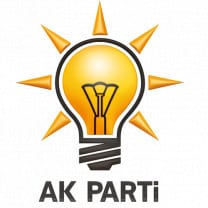
The AK Party (also known as AKP), or the Justice and Development Party, is the governing party in Türkiye. The party won all general elections since its first entered in 2002. The AK Party is a social conservative party mostly characterised by an Islamist and neo-liberal reformist agenda. The party draws significant support from non-secular Turks, mainly from the Anatolian heartland. This group contains about 35 million people, which are no longer poor but not rich yet, an in-between group looking for power, money and identity. These people are keen on the rhetoric of AK Party, because it is communicated tooscillate between conservatism, fundamentalism and progress. However, critics in Turkish society slammed the increasingly more Islamist course in Turkish domestic politics, a claim rejected by officials of the AK party. Several academics state the party had an ideological turn in recent years, where Turkish nationalism and right-wing populism dominate the AK party’s ideological stance.
When the AK Party was launched in 2001, it initially looked to blend a pro-Western and Islamist outlook. Together with the democratic and liberal market approach, the party enjoyed popular support among Turkish society. The AK Party always advocated for centralised leadership in a presidential system, which eventually became reality after the constitutional changes following the 2017 referendum. However, in recent years, the party suffered from a decrease in Erdoğan’s popularity following his increasingly authoritarian grip on the country and ideological nationalist turn. Multiple high-ranking party officials left the AK Party, including conservative Ahmet Davutoglu, who proceeded to form the Future Party. Ali Babacan, a former liberal member of the AK Party, proceeded to form the Democracy and Progress Party (DEVA). Former president Abdullah Gül, one of the co-founders of the AK Party together with Erdoğan, broke ranks with the party following his discontent with the party and Erdoğan.
Despite the party proving its dominance in general elections since its first entry in 2002, this trend was broken when the 2019 local elections in Istanbul and Ankara were lost to opposition party CHP. The opposition now controls 5 out of Türkiye’s 6 largest population centres, as CHP candidates also won again in Izmir and gained the majority in Antalya from the AK Party. The vote in Istanbul even turned into a landslide victory for the CHP after a re-run at the insistence of the AK Party. The 2019 local elections could be a harbinger that the AK Party's two-decade-long dominance may be broken in the coming elections.
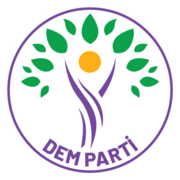
The People's Equality and Democracy Party (DEM Parti) is a pro-Kurdish party. It is a green and left-libertarian merger of the Greens' Party and the Equality and Democracy Party. In 2023, the People's Democratic Party (HDP) handed over its work to the party as well, making it the largest Kurdish independence movement in Türkiye.
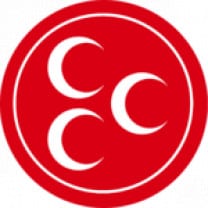
The Nationalist Movement Party (MHP) is a far-right ultranationalist party. The party has a controversial reputation with the MHP youth movement, nicknamed the Grey Wolves, which is known for paramilitary activities. Since the elections of 1999, in which the party became Türkiye’s second party, the MHP is led by Devlet Bahceli. In the following years, the party booked varying success but its popularity seems in declined since MHP became part of the People’s Alliance together with AK Party to secure the re-election of Erdoğan.
The ideological stance of MHP is based on the Nine-Light doctrine which is developed by the founder of the party Aparslan Türkes. The doctrine principally promotes Turkish nationalism fundamentally shaped by Islam. Critics often describe the party to show signs of neo-fascism, despite efforts of current leader Bahçeli to make the programme of the MHP more moderate and pro-democratic since he came to power. The MHP is strongly opposed to the pro-Kurdish HDP, and takes an un-democratic and authoritarian stance towards the opposition party.

The İyi Party (IYI) was established on 25 October 2017 by Meral Akşener, and the party adheres to the principles of Türkiye's founder Mustafa Kemal Atatürk. The party follows a centrist ideology and prioritises the restoration of the parliamentary system and the integrity of the judiciary institutions. The party is regarded as an anti-Erdoğan alternative for disillusioned MHP and AK Party voters on the right side of the political spectrum. The party strives for positive relations with the European Union and rapprochement of Türkiye to the Western Bloc. The party also advocates for civic nationalism and is critical of the ineffectiveness of Türkiye’s political system. Furthermore, the party pleads for harmony between ethnic minorities based on Kemalist principles.
The party was formed by prominent former members of the MHP and CHP, most of these MHP defectors came up with the idea to form a new party after the controversial referendum of 2017, in which the MHP voted in favour of granting Erdoğan more power. The party quickly gained strength when five members of the Turkish parliament joined the party, and on 22 April 2018 a further 15 MPs from the CHP moved to the party. Which allowed the party to establish a parliamentary group, that would be eligible to field a candidate for the presidential election without the need to collect signatures. In the 2018 election, IYI participated as part of the Nation Alliance. In the 2023 election, the party will be a member of the newly formed opposition alliance ‘Table of Six’.
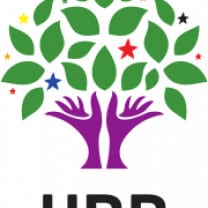
The People's Democratic Party (HDP) is a left-wing pro-Kurdish minority party in Türkiye. The main objective of the party is to challenge marginalisation of the ethnic Kurds in Türkiye and bringing a solution to the Kurdish issue. The party rallies for a federal Kurdish state and campaign for an end of Turkish military campaigns in Kurdish areas in Northern Iraq and Syria. The party mainly finds support in the eastern provinces of Türkiye, where most Kurds are living. Türkiye's President Erdoğan has repeatedly tried to ban the party, as he claims it has links to the PKK, that is considered a terrorist organisation.
Founded in 2012, the HDP entered the general elections of June 2015, in which it won 80 seats and became part of the short-lived interim election government. However, new elections were held again after just 5 months, in which the party lost 21 seats and came to a total of 59 seats in the parliament. In 2018, the party won 67 seats. In the latest elections, HDP became part of the opposition. Since 2022, HDP heads the Labour and Freedom Alliance in which six Kurdish and (smaller) left-wing parties cooperate. HDP is also an associate member of the Party of European Socialists (PES) and participates in the Progressive Alliance. In the presidential elections, HDP candidate Selahattin Demirtaş came in third in 2014 and 2018. The party is currently led by Pervin Buldan and Mithat Sancar, as the party uses a co-presidential system of leadership with one chairwoman and one chairman.
In the 2023 general elections the party decided to join the DEM Parti list.
4 Biographies
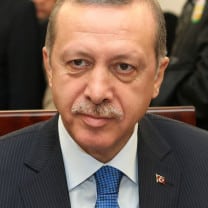
Recep Tayyip Erdogan was born on 26 February 1954 in Rize, a small city on the Black Sea coast. When Erdogan was 13, his family moved to Istanbul. He went to an Islamic school and studied business management at the Marmara University of Istanbul. After having finished his studies, Erdogan worked for Istanbul’s transportation authority, until he was sacked for refusing to shave his moustache, on religious grounds.
Subsequently, Erdogan entered politics. In 1994 he was elected mayor of Istanbul. At that time he was the leader of the Islamic oriented Welfare Party, which was banned from politics in January 1998 by the highest court of Türkiye. This was on the grounds that the party sought to undermine Türkiye’s secular basis. Erdogan got indicted on subversion charges and was sentenced to ten months in jail from March 1999. Upon his release from prison, Erdogan was one of the founders of the Justice and Development Party (AKP), in August 2001, and became its leader in 2002. That same year, the AKP won the parliamentary elections and came to power. Because of his previous conviction, Erdogan was banned from serving in any government position. Nonetheless, his party’s parliamentary majority revoked the ban by passing a constitutional amendment. Erdogan became Prime Minister in March 2003, replacing Abdullah Gul. In 2014, Erdogan won the presidential elections and, therefore, became the first directly elected President of Türkiye.
Since then, Erdogan has moderated his position. In the 2007 parliamentary elections, his position as Prime Minister was consolidated. He experienced an important victory in 2008 when parliament voted to repeal a ban on wearing the headscarf on private or public university campuses.
Recep Tayyip Erdogan is married and has two children.
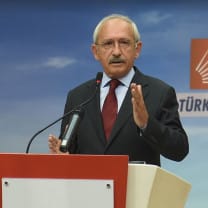
Kemal Kilicdaroglu was born on 17 December 1948 in Nazimiye, in the province of Tunceli. He is from Kurdish origin and also has Armenian ancestry. Kilicdaroglu was educated in economics at the Gazi University in Ankara. After having finished university in 1971, Kilicdaroglu served in the Ministry of Finance as a Deputy Accountant and later on as an Accountant. In 1983 he became Deputy Director General of the Revenues Department in the same ministry. Eight years later, in 1991, Kilicdaroglu was appointed Director-General of respectively two social security administrations.
He entered politics in 1994, but did not manage to get on the candidate list of the Democratic Left Party (DSP). However, he was invited by the leader of the CHP, Deniz Baykal, to join his party. In 2002 he was elected into parliament as a deputy from Istanbul, to be re-elected in 2007. Kilicdaroglu’s efforts to uncover corruption among the AKP carried him to headlines in the Turkish media.
Kilicdaroglu was nominated as candidate for the Mayor of Istanbul for the CHP in the 2009 local elections, gaining 37 percent of the votes. When Deniz Baykal resigned in May 2010, Kilicdaroglu was elected as the leader and breath new life into the party. After the dissapointing results and failed attempt to defeat Erdogan's AKP in the 2023 general elections, Kilicdaroglu was sacked as the party's leader.
Kemal Kilicdaroglu is married and has a son and two daughters.
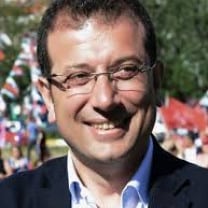
Ekrem İmamoğlu is the current Mayor of Istanbul since 2019. He was elected in the March 2019 mayoral elections, running for the Nation Alliance, consisting from CHP and the IYI Party. The results were cancelled by the Supreme Electoral Council due to concerns about the credentials of several members of the polling staff. Many regarded the ruling as politically motivated since the AK party claimed the elections results were invalid from the moment they became public. A new election was held on 23 June 2019, in which İmamoğlu was re-elected as mayor. This time his main challenger and AK party member Binali Yildrim, congratualted İmamoğlu with his victory and soon after that President Erdoğan congratulated him as well. As mayor of Istanbul, İmamoğlu has cut funding for groups related to Erdoğan's government which are estimated to be worth around 350 million Turkish Liras. The election of İmamoğlu and his subsequent actions against organisations related to Erdoğan are seen as one of the biggest achievements for the opposition in Türkiye. Especially since they struggle to keep their influence in the Turkish society, following the attempted coup in 2016 and subsequent arrests of prominent opposition members.
Subscribe to our newsletter
